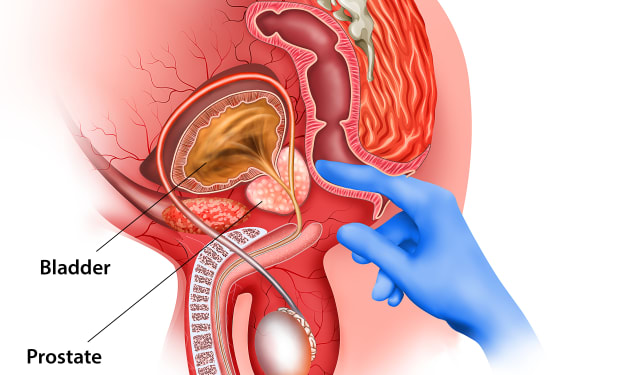Prostate cancer and Sex- Shockwave Clinic Ltd.
Europe's Leading Men's Health Shockwave Clinic

Prostate cancer is a common form of cancer in men, with over 47,500 new cases diagnosed in the UK each year. It is the most common cancer in men, accounting for around 26% of all male cancer diagnoses. Despite being common cancer, there are still many misconceptions and misunderstandings surrounding prostate cancer, its causes, and its treatments.
One of the misconceptions surrounding prostate cancer is that it only affects older men. While it is true that prostate cancer is more common in men over the age of 50, younger men can still develop the disease. In fact, around 8% of prostate cancer diagnoses are made in men under the age of 50.
Another misconception is that prostate cancer always causes symptoms. Prostate cancer in its early stages may not even exhibit any symptoms at all. It is therefore important for men to be aware of their risk factors for prostate cancer, and to undergo regular screening tests.
Risk factors for prostate cancer include age, family history, and ethnicity. Men with a father or brother who has had prostate cancer are twice as likely to develop the disease themselves, and men of African or Caribbean descent are also at higher risk.
Screening for prostate cancer involves a blood test called the prostate-specific antigen (PSA) test, which measures the level of PSA in a man's blood. High levels of PSA can indicate the presence of prostate cancer, although it is important to note that other conditions can also cause raised PSA levels. If a man's PSA levels are high, further tests may be needed to determine whether he has prostate cancer.
If prostate cancer is diagnosed, the treatment options will depend on the stage and grade of cancer, as well as the man's overall health and personal preferences. Active surveillance, surgery, radiation therapy, hormone therapy, and chemotherapy are all possible forms of treatment.
Active surveillance involves monitoring cancer to see whether it is growing or changing. This may be an appropriate option for men with low-risk prostate cancer, who are unlikely to experience any symptoms or complications from cancer.
Surgery involves removing the prostate gland and may be recommended for men with more aggressive prostate cancer. Radiation therapy involves using high-energy radiation to kill cancer cells, while hormone therapy involves lowering the level of testosterone in the body, which can slow the growth of prostate cancer. Chemotherapy may also be used in some cases, although it is usually reserved for men with advanced prostate cancer. However, patients may suffer from various sexual issues as side effects, due to these treatments. A lot of men typically experience PD, PE and ED caused by prostate cancer surgery.
In addition to these conventional treatments, there is also a range of alternative and complementary therapies that some men may consider. These may include dietary changes, nutritional supplements, acupuncture, massage therapy, and herbal remedies. While some of these therapies may be helpful in managing symptoms and improving quality of life, it is important to note that there is limited scientific evidence to support their use in treating prostate cancer.
One alternative therapy that has gained popularity in recent years is shockwave therapy. Shockwave therapy involves using high-energy sound waves to break up tissue and promote healing. It has been used for a range of medical conditions, including kidney stones and musculoskeletal injuries, and is now being investigated as a treatment for prostate cancer.
Shockwave therapy for prostate cancer involves delivering high-energy sound waves to the prostate gland, with the aim of destroying cancer cells and promoting healing. The treatment is usually carried out under local anaesthesia, and involves inserting a small probe into the rectum. The probe then emits high-energy sound waves, which are targeted at the prostate gland.
There is currently limited scientific evidence to support the use of shockwave therapy for prostate cancer. However, some early studies have suggested that the treatment may be effective in reducing the size of tumours and improving symptoms. One study, published in the journal Urology, found that shockwave therapy was safe and effective in reducing the size of prostate tumours in men with early-stage prostate cancer. Another study, published in the Journal of Endourology, reported that shockwave therapy was associated with a significant reduction in PSA levels in men with advanced prostate cancer. Despite these promising results, more research is needed to determine the safety and effectiveness of shockwave therapy for prostate cancer.
It is important for men with prostate cancer to discuss all of their treatment options with their healthcare team, and to make an informed decision based on their individual circumstances and preferences. While alternative and complementary therapies such as shockwave therapy for prostate cancer may be appealing, it is important to consider the potential risks and benefits before undergoing any treatment.
In addition to medical treatments, there are also a range of lifestyle changes that men with prostate cancer can make to improve their overall health and wellbeing. These may include eating a healthy diet, staying physically active, reducing stress, and avoiding smoking and excessive alcohol consumption. These lifestyle changes can help to manage symptoms, reduce the risk of complications, and improve quality of life for men with prostate cancer.
In conclusion, prostate cancer is a common cancer in men, with a range of treatment options available depending on the stage and grade of the cancer. While alternative and complementary therapies such as shockwave therapy may be appealing, more research is needed to determine their safety and effectiveness. Men with prostate cancer should discuss all of their treatment options with their healthcare team, and make an informed decision based on their individual circumstances and preferences.
As discussed above, treatments for prostate cancer can cause various sexual issues such as ED, PE and PD in men. And in order to treat these side effects and enjoy a sex life, it’s advisable to check out well-known health clinics and seek medical attention. One such well-known men’s health clinic is MansMatters. Mansmatters provides a wide range of non-invasive treatments to males who are suffering from ED, PD or other sexual issues after undergoing prostate cancer treatments. The clinic offers the best shockwave therapy for ED in the entire Europe. Also, modern treatment options like NanoVI, Tesla chair and EMTT therapy are also provided in this clinic.







Comments
There are no comments for this story
Be the first to respond and start the conversation.